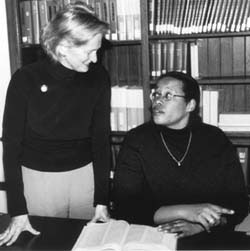Winning the Social War Through Education
The Andrew W. Mellon Foundation has awarded a grant to support the groundbreaking research of Professors Cally Waite and Margaret Crocco, who will be studying "The Education of Southern African Americans in Northern Research Institutions from Plessy to Brown (1896-1954)."
The project seeks to explore a prominent, yet understudied, historical example of African Americans and whites working together to improve education for all races. Waite and Crocco believe "the story to be told here is an important one. Historians have often viewed African-American education as a solely southern domain. This research is important because we will examine the role northern institutions played in the preparation of black scholars for educational and social leadership. We believe our research will be a significant contribution to the literature concerning the history of American education."
Waite is Assistant Professor of History and Education and Crocco is Associate Professor of Social Studies and Education at Teachers College.
Speaking about the intent of the research, Crocco said, "On a very fundamental level the research is to establish a description of what the phenomenon was and to understand why these individuals came out of the South to the North for their education. What did they find here and how did it affect their subsequent professional careers? These were the people who came to schools like Teachers College and New York University and who became the leaders, faculty, and administrators of Historically Black Colleges and Universities (HBCUs) at a very critical period leading up to the Brown case. And on the white side, what was the perception of whites about what they were doing? What were their motivations for this kind of bi-racial exercise in educational development?"
Waite added, "Another goal is not content but historiographical. This project has raised crucial issues about historical research in the education of African Americans. While a great deal of material exists, access to these sources requires flexibility and creativity in the search process."
As a first step in their comprehensive effort, Waite and Crocco have uncovered the connections between Teachers College and HBCUs, notably Hampton, Tuskegee, Fisk, Lincoln and Howard Universities. The researchers also wish to trace the careers of a small sample of African-American Teachers College graduates during the decades under consideration and do oral histories with those who can be identified among Teachers College alumni records as faculty and administrators at HBCUs during the period up to 1954.
As a comprehensive school of education originally offering both undergraduate and graduate degrees in a wide variety of programs, Teachers College drew from across the United States as well as around the world. In the 1930s both Booker T. Washington and W.E.B. Dubois spoke at Teachers College in a lecture series on African-American education.
African Americans attended Teachers College in small but significant numbers during the years 1896 to 1954. Between 1930 and 1960, according to Horace Mann Bond (1972), Teachers College awarded 144 doctoral degrees to graduates of Black Colleges, more than any other American institution of higher learning. Following close behind was New York University. During the first half of the twentieth century, several generations of African-American leaders earned degrees at Harvard, Yale, Ohio State, and the University of Chicago, among others.
"As a result," Waite said, "many graduates of northern institutions became faculty and administrators at HBCUs, as well as teachers in segregated schools throughout the South." "Given the realities of the time period," Crocco commented, "the story of the connections between TC, NYU, and the HBCUs wasn't completely about liberating the races from the expectations that existed for them."
A variety of "push" and "pull" factors attracted African-American scholars to northern institutions. Propelling them out of the South were segregation and the willingness of southern state governments to fund graduate education for African-American students in northern institutions rather than allowing them to enroll in state universities.
"Drawing them North were educational opportunities," Waite said.
"At Teachers College in particular, there were innovative programs not found in southern institutions such as social studies, educational administration (especially for the new role of 'dean of women'), educational sociology, guidance and counseling," she continued.
Changes in thinking about education, democracy, and school integration will be examined through the stories of both African-American and white scholars associated with Teachers College and their experiences as professional educators after they left Teachers College. Research at Teachers College and New York University will serve as a template for pursuing a more comprehensive project involving other northern educational institutions.
Published Tuesday, Sep. 18, 2001
